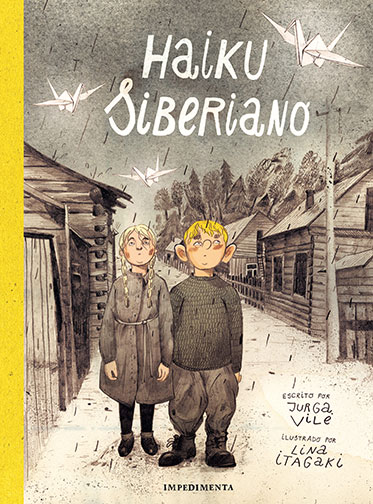Mark Twain said that when he was younger he could remember everything, whether it had happened or not. Our memory can sometimes move to the limits of fiction, especially when we go back to those most childhood memories. Can we trust our memory then? Did things really happen like this? Or are we imagining that they happened like this? More than remembering, we often imagine our own memories, creating a new story. In “Haiku siberiano”, the excellent graphic novel that in 2017 marked the debut of Jurga Vilé, the Lithuanian author moves between truthfulness and fiction, blurring their limits, to tell us the story of her grandfather Algis. And the result is a strangely luminous story of survival and overcoming the darkest of times.
On June 14, 1941, shortly after Lithuania had been annexed by the Soviet Union, Soviet soldiers knocked on the door of young Algis and his family, forcing them to leave their home. His father will be taken to a forced labor camp, while Algis and the rest of his family will be deported to Siberia, where they will have to survive in the most inhospitable conditions. The personal story of his grandfather helps Vilé to explain the human drama that involved the deportation of 17,000 Lithuanians to remote Siberia. And it uses a resource that intensifies this drama: the one who narrates the story is the child Algis himself, a first-person narrator through whom we see the world and all the atrocities that happen around him. From that candid look, sometimes the horror seems not to be so.
Miguel Hernández wrote that “There are nightingales that sing above the rifles and in the middle of the battles”: Algis and other deportees also sing songs, perhaps to avoid being swallowed up by the hopelessness of being doomed to the worst imaginable conditions of hunger and cold, thus opening a small crack for the hope of returning to their beloved Lithuania, of to plant apples again, to collect honey again and to reunite with his father. However, the most brilliant and precious moments of the story are those in which the child’s imagination, that territory where Soviet soldiers cannot enter, takes the reins. The narrator tells us events that may or may not have happened. But whether they have happened or not is immaterial, because they are all part of his story.
It is precisely Lina Itagaki’s pencil that finishes evoking that child’s world of imagination. She commented before that Vilé moves between veracity and fable, between the terrible reality that surrounds the narrator and those moments in which his imagination flies free. She also does it between languages, creating a hybrid between graphic novel and illustrated book. This allows Itagaki to get rid of possible stylistic and formal corsets, thus moving freely and fluidly through the story. Texts and images move across the pages, with that carefree creativity of children that we adults often secretly envy, and whose best example is the lettering, dotted with funny pictograms, in which uppercase and lowercase letters are shamelessly mixed, as and like a child would do it.
Edited by Impedimenta, “Haiku siberiano”, which received the National Children’s Literature Award in its country, is a magnificent example that it is possible to create a work for all audiences without giving up delving into the most atrocious aspects of our history. The choice of a child as narrator is, from my point of view, a complete success. Through his innocent eyes, any conflict is stripped of the meaning that those who perpetrate it want to give it. Then only the senselessness of violence is possible, of which children are always the most unjust victims.
